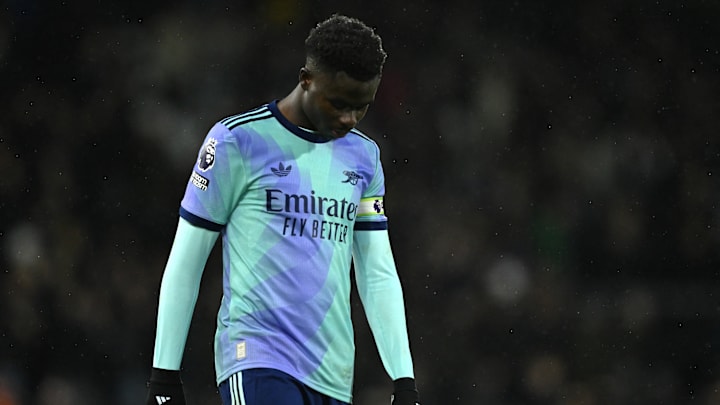Ultimately, we were half a yard away from lauding a far-from-perfect but gritty performance away from home in the Premier League.
Fulham currently rank among the best six teams in the division, and Arsenal will not be the last 'big six' member to drop points at Craven Cottage this season.
If Gabriel Martinelli opts against veering into an offside position in the build-up to Bukayo Saka's cruelly denied winner, the conversations we're currently having would be drastically different in tone.
Arsenal ultimately failed to put serious pressure on league leaders Liverpool by drawing at Fulham, and Chelsea's subsequent 4-3 victory over Tottenham means the Blues are now the Reds' closest competitors at the summit.
The title may seem a far cry after Sunday's stalling of momentum, but there's still a long way to go. However, Arsenal have issues which require surgery. Here are three attacking problems Mikel Arteta must swiftly solve before the Gunners' title hopes dissipate into the abyss.
1. Inability to turn pressure into chances

There wasn't too much wrong with Arsenal's performance against a well-balanced Fulham team. After falling behind to an excellent Raul Jimenez finish (Fulham's first venture forward), the Gunners were playing catch-up.
The game state certainly wasn't preferable, but Arsenal did a good job of limiting the Cottagers in transition thereafter. Mikel Arteta's structure held up well, allowing the Gunners to sustain pressure against Fulham's 5-4-1 block.
Unfortunately, Arsenal's performance in the final third was reminiscent of their woes against Inter - only Fulham weren't subject to a crossing barrage (32 on this occasion). Bernd Leno was forced into action on just a couple of occasions, with Arsenal's biggest chances arriving from, you guessed it, set-pieces.
The Gunners created just 0.3 xG from open play on Sunday, with their open play tally for the season ranking a measly 13th in the Premier League. There have been mitigating factors at play for this lowly output, but they weren't wreaking havoc at Craven Cottage. In fact, over the previous eight Premier League games, Arsenal are averaging a mere 0.79 open-play xG per game - the third-lowest figure in the league.
Arsenal have been able to assert impressive control and limit their opponents, but their inability to turn pressure into open-play chances has hurt them in multiple games this season.
2. Unbalanced out wide

Martin Odegaard has doubtlessly alleviated some of the attacking woes which plagued Arsenal's performances while the captain was absent. Odegaard, though, was present at Craven Cottage as the Gunners huffed and puffed against a stubborn 5-4-1 Fulham block.
These are the sorts of contests which require the tight-space magic of the Norwegian, but Odegaard was on the periphery here despite his prominence. There were plenty of touches, but few of decisive impact.
With Odegaard back in the team, Arsenal are funnelling their attacks down the right-hand side more than ever. The Nordic playmaker typically works in beautiful harmony with Bukayo Saka, but perhaps you can have too much of a good thing. Arsenal are becoming predictable.
53% of the Gunners' attacks on Sunday came down the right-hand side. Just 26% arrived down the left and 20% through the centre. They've been unable to penetrate centrally all season.
Now, Arsenal are aiming to use the overload to isolate principle in order to create high-quality scoring opportunities for the left-winger/box-crashing midfield at the back post. We saw how effective this can be in the 5-1 thumping of Sporting CP.
However, there's no doubt that Arteta requires more from more players going forward. He can't dictate Arsenal's thinking in the final third with rehearsed sequences typically saved for the build-up phase, but he can inspire greater variety in attack through braver team selection.
The left-hand side is almost obsolete when Riccardo Calafiori isn't in the team, and please, please, please can we stop using Declan Rice as a between-the-lines playmaker who runs in behind?
Attacking balance is required to drift away from the realm of predictability. What happens when Odegaard, as he did on Sunday, isn't at the races or Saka picks up an injury?
3. The Kai Havertz problem

Havertz is not necessarily a forward who should be judged by his attacking output, and he's always a likely scapegoat when he drops shoddy performances as was the case against Fulham.
The German is a do-it-all focal point when the Gunners purr, but a languid absentee when he struggles to find his groove. When he isn't creating space for his teammates and smartly connecting with those in close proximity, Havertz can appear clumsy and rash, seemingly focused on running into his opponents as opposed to actually challenging for the ball in the air.
He's currently averaging a goal contribution every two games in the Premier League this season, which isn't a horrendous record, but it's perhaps underwhelming given Arsenal's aspirations. You don't need an Erling Haaland-like goal machine to win Premier League titles, but a diverse portfolio of contributors, as was the case last season, is required and Arsenal currently don't have that.
Only two players (Havertz and Saka) have scored more than four Premier League goals this season.
Havertz remains a serviceable option despite his poor performance on Sunday and struggles when Odegaard was out of the team. However, Gabriel Jesus' continued demise means Arteta will have to lean on the German up top for much of the season unless a high-profile addition arrives in January - and that seems unlikely.
He's running on fumes, but respite will be in short supply over the next month
